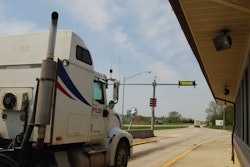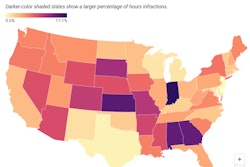Since Overdrive published the above poll here at the website and began collecting readers' thoughts about a speed-limiter mandate, currently in the early stages of pursuit by the Federal Motor Carrier Safety Administration, it's been clear that objections to a mandate proliferate among the readership, most centered on safety concerns. Chiefly, readers worry about the potential for uniform speed-limiting of heavy-duty trucks to dramatically increase the interactions between impatient passenger-vehicle drivers and the professionals, the intersection at which so many of today's truck-involved accidents happen.
Georgia-based owner-operator Gary Shaw echoed the thoughts of the 79% of readers who objected to the mandate categorically when he called it "the dumbest idea I’ve ever heard," simply put. A speed limiter mandate used at a low speed setting, in particular, Shaw believes, will also exacerbate what he sees as a problem among fellow professional drivers "already trying to race the clock" to get as many miles in as possible within allowed time under the hours of service. And "if everybody's at sixty miles an hour," he predicted, rolling roadblocks are likely to be the result.

Marshall Blasingame, commenting under the above poll at OverdriveOnline.com, also questioned the need for a limiting technology given "we have speed limits on the road," he noted. He follows them, he added: "I've been driving 45-plus years, own my own truck, and have a very clean record. I have no speed limiter on my truck." Under a mandate, he offered to regulators, "you think you have congestion now? It'll be ten times worse."
Expect rear-end collisions from four-wheelers to spike under such a mandate, Shaw said. There's a reason, ultimately, truck-involved crashes fell off in 2020 when four-wheelers were on the highways in much smaller numbers, particularly in the early COVID pandemic months. A recent analysis by Overdrive and sister business unit RigDig showed truck-involved crashes per power unit in operation fell by a dramatic 13% from 2019 to 2020, measured for the full calendar year. Crashes per carrier-reported miles run fell by around 10%, too.
Much, though not all of those gains were erased looking at calendar year 2021, when by and large the general public returned to the nation's roads in earnest. “If all trucks are going the same speed," suggested John Cochran, one of more than 10,500 commenters as yet responding to the FMCSA's recent request via the Federal Register, even more risky behavior by the general public is likely to result.
"Cars will get mad and try to get around no matter the risk they take,” wrote Cochran. “It's a very bad idea and will further cripple the industry. So many of us will leave the industry and park the trucks. You can't get the supply chain caught up now. What do you think will happen with fewer trucks on the road? Stop trying to control our every move. We aren't robots.”
With 18 days remaining to file comments in response to the federal request, the general sense that emerges from what's there today is that there's little support for a limiter mandate going around.
Joshua Reigles, called a potential speed limiter mandate “government overreach at its finest.” He added that speed limiters would “further the anger that the general public feels towards trucks when they're on their daily commute.”
Owner-operator John Hutto, who in his comments said he’s a farmer with eight trucks, believed a speed limiter rule would hurt his business while providing no benefit for other drivers. “With the current shortage of drivers, slowing down the safe experienced drivers already working sounds like a terrible idea."
Aaron Thomas said he started out in trucking driving trucks governed to 62 mph and, being a new driver back then, thought it was harsh but also kept him safe and away from speeding tickets. “Now that I'm an owner-operator," though, he added, "having the freedom to run the speed limit in most states is nice, and it also helps me get around slower trucks faster to prevent safety issues” arising. He thinks a mandate overall is “a bad idea. I believe the highways will be congested with several trucks trying to pass each other with no real means to accelerate to a safe passing speed. I feel that if you’re going to limit trucks, you should limit all motor vehicles traveling on the roads” to 80 mph.
Regulatory docket commenter Louis Evans laid out a five-point argument on the cons of a governed truck speed. His five main points: unintended safety issues, traffic congestion, increased emissions, major loss for small owner-operators, and increased pressure on truck drivers.
Evans cited studies that found higher speed differentials between trucks and other vehicles created more accidents on highways due to more interactions between vehicles. He also noted slower trucks would result in “frustration and bad driving decisions” when drivers feel they are losing time.
Regarding emissions, Evans said that while driving slower might reduce emissions, the congestion created by speed limiters would negate that effect.
Further, Evans believed one of the most important cons of speed limiters would be generally increased stress and pressure drivers will inevitably feel to meet deadlines and make up for lost time due to slower speeds. “Driver’s health is essential for their productivity,” he said. “If they are constantly under pressure, they won’t be able to meet the requirements, especially with speed limiters slowing down the transportation process.”
Fifty-plus-year on-highway veteran Jim Anderson, commenting under Overdrive's polling, summed up a lot of the negative sentiment associated with a speed-limiter mandate by urging regulators not to punish all on account of the mistakes of the few. "Part of the job of truck driving is being responsible and doing the right thing in the first place," Anderson noted, suggesting tougher penalties for speed scofflaws in professional transportation.
If a limiter mandate comes down, he went on, "I will be done trucking after fifty-plus years."
Readers can access FMCSA's open regulatory docket and file a comment via this link.








